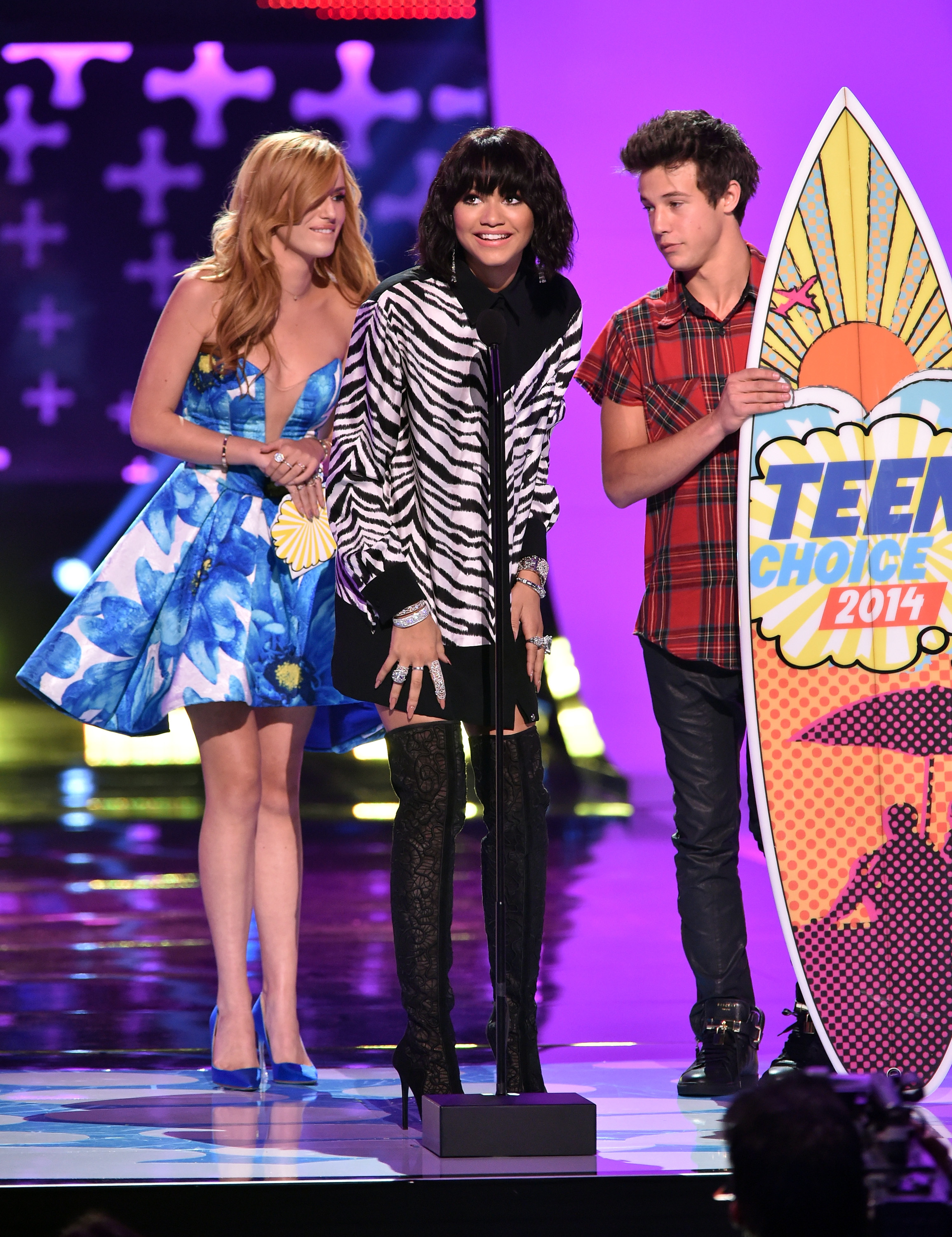
There was a controversy at last night’s Teen Choice Awards, although it wasn’t about a midriff-baring red carpet outfit or whether One Direction is better than 5 Seconds of Summer. No, the nature of the scandal was something much more complicated: whether the awards were rigged or not.
Some background: in an era where reality TV is either outlandish wine-throwing or as rehearsed and stiff as a Botoxed Kardashian forehead, teens have begun flocking to YouTube in search of authenticity — real people being honest about their lives. YouTube vloggers and Vine stars, who primarily appeal to a teenage demographic, have accrued millions of subscribers and big endorsement deals with major brands like L’Oreal and Taco Bell. Increasingly, they’re making a bid for mainstream success.
But the tension between old Hollywood (that is, 20-something Hollywood) and new social media stars came to a head when the Teen Choice Awards proudly rolled out social media categories for the first time, honoring the YouTube and Vine stars who, according to a recent Variety cover, have even more influence over teens and their purchasing decisions than traditional superstars like Jennifer Lawrence and Katy Perry. But the decision to highlight social media stars backfired when Vine celebrity Cameron Dallas lost the award for “Best Choice Web Star: Male” (although he won “Choice Viner”). He wrote (and then deleted) a post on Twitter to his 3.1 million followers: “It’s funny how they told me I won the winner award 6 days before the voting ended and made the runners up still tweet to vote for them.”
Another Vine celeb, Matthew Espinosa, tweeted to his almost 2 million followers, “Basically they picked the people almost 6 days before voting was done and used all of us for promotion.” Outraged fans responded with the hashtag #teensdonthaveachoiceawards, which trended on Twitter throughout the night.
It’s no secret that the Teen Choice Awards aren’t entirely democratic. It even says on the site where you vote: “Teenasaurus Rox reserved the right to choose the winner from the top four vote getters.” But Fox, who aired the awards show, can’t be happy that the renewed attention arose thanks to tweets from one of the evening’s winners.
Dallas, Espinosa, and other stars like them are breaking a long tradition of stars gamely cooperating with studios, record labels, corporations and the media. In the 1950s, studios used to employ “fixers” who would hide celebrity scandals at any cost to make sure that actors’ images remained untainted. Those days feel far away in an era where TMZ captures every insult uttered to a paparazzo, every DUI, every wardrobe malfunction. But celebrities have responded by closely controlling the message: Angelina Jolie and Brad Pitt sell photos of their children taken by their own photographers to magazines so as to control their public persona; many celebs hire people just to run their Twitter account; and high-profile couples like Beyonce and Jay-Z combat rumors of divorce with happy family photos on Instagram.
Sometimes, still, celebs go rogue, like when Kanye West interrupted Taylor Swift at the VMAs or Jason Biggs tweeted an offensive joke. But for the most part, celebrities have understood that the safest way to work to the top is to make it within the system. Even the most “authentic” celebrities, like Jennifer Lawrence — who has become America’s sweetheart by tripping on the red carpet and admitting that she’s hungry at awards shows after starving herself all day — often hide who they are dating or what they look like without makeup.
Not so for teen celebs on YouTube and Vine who have built a fan following based on their “authenticity.” The seemingly spontaneous clips often involve Internet stars pouring out their hearts. Teens have latched onto these kernels of truth: unfiltered social media personalities have angsty feelings, make mistakes and call out authoritarian figures — just like us! YouTube stars were thought to be more engaging, extraordinary and relatable than Hollywood stars, according to the Variety survey. And they’re prolific: YouTube now reaches more 18-34-year-olds in the U.S. than any cable network, according to Nielsen.
But authenticity is risky business. These stars, like their teenage peers, can be reckless on social media: just look at this most recent Teen Choice Awards scandal, or Nash Grier, the most followed person on Vine, who recorded a video using a gay slur. They’re also not beholden to a big studio or television network; accountable only to themselves, they’re freer to be candid without fear of repercussions.
That makes them hard to incorporate into conventional Hollywood rituals — like the Teen Choice Awards — when anyone can tweet their dissent to their millions of followers. Tweets like Dallas’ could be the death knoll for artifice on awards shows, reality shows or even celebrities’ personal social media accounts; YouTube stars and their followers clearly feel empowered to be transparent about their participation in the PR machine.
If the old guard wants to keep their hold over young viewers’ minds — and wallets — they need to step up their game. Internet celebrities who have spent years baring their souls in vlogs won’t be so willing to feign surprise when they’re given an award. Today’s teens are savvy enough to leverage their personalities into lucrative global brands on YouTube — they’re more than smart enough to call bullshit on traditional media.
More Must-Reads from TIME
- Donald Trump Is TIME's 2024 Person of the Year
- Why We Chose Trump as Person of the Year
- Is Intermittent Fasting Good or Bad for You?
- The 100 Must-Read Books of 2024
- The 20 Best Christmas TV Episodes
- Column: If Optimism Feels Ridiculous Now, Try Hope
- The Future of Climate Action Is Trade Policy
- Merle Bombardieri Is Helping People Make the Baby Decision
Write to Eliana Dockterman at eliana.dockterman@time.com